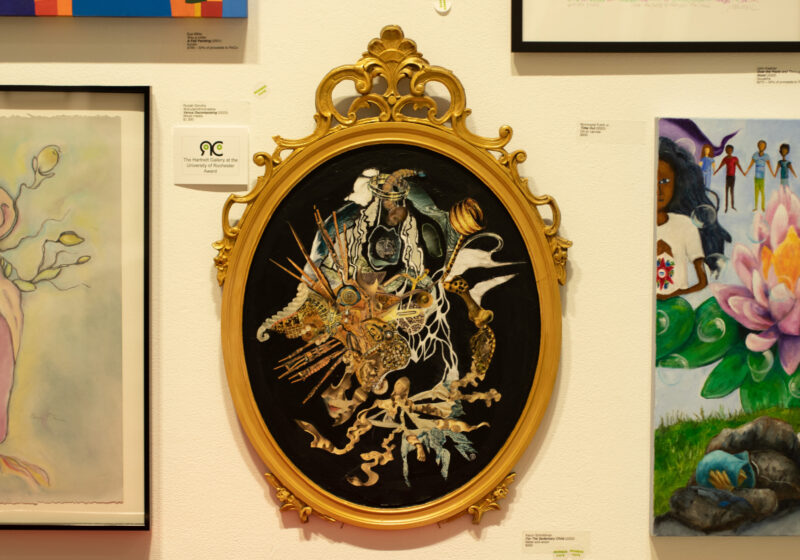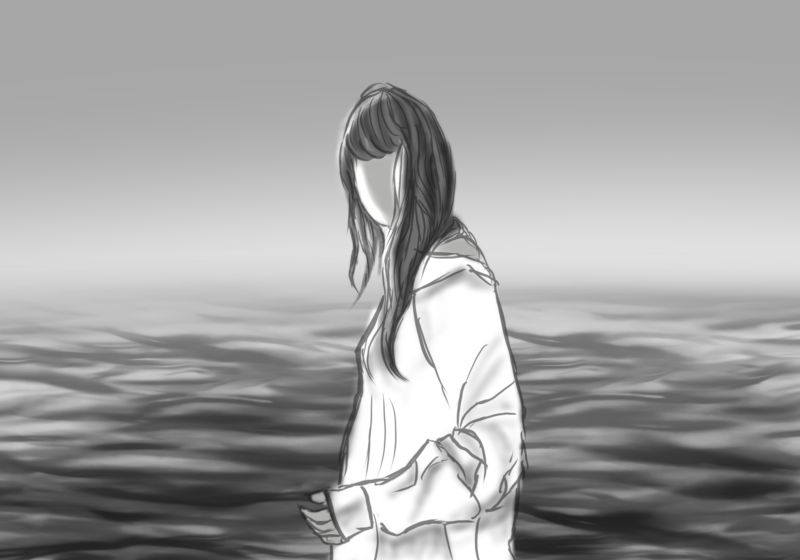“Venus Decomposing,” an ink and collage-based art piece created by Rochester-based artist Rivka Simcha ’14, piqued our interest when it won the Hartnett Gallery’s “Hartnett Award” for “experimental, curious work” last month.
Simcha has experience in multiple artistic forms, including theatre, music, and, of course, the studio arts. She is actively involved in the theatre troupe The Velvet Noose and works at the Memorial Art Gallery.
Formed from the scraps of Simcha’s old work and found objects, “Venus Decomposing” melds together materials including gems, magazine scraps, and classic ink — embodying even in its process the cycle of deconstruction and reconstruction it comments on visually. Even the piece’s gorgeous frame, an ornate mirror repurposed into a canvas, originally came to Simcha when she found it on the side of the road.
“Venus Decomposing” was created under the name Shulamith in Shadow — a pseudonym she uses with a rich history rooted in literature and art. The piece and identity relate to Simcha’s Jewish identity and to one of her inspirations, Anslem Kiefer, a German painter and sculptor. Kiefer’s painting “Sulamith” — based on a poem called “Death Fugue” written by Paul Celan — depicts a German Soldier memorial from a darker perspective, one sensitive to the atrocities inseparable from the monument. The piece taps into the ideas of death and grief that steep Simcha’s work as well, and she mentioned that she was “enchanted by that piece at the time… as I reflected on the nature of my work which is about grief and transformation and how we can make it out of the more painful places of life.”
Simcha talked at length about how art has impacted her life and about other forms of media that bring a deeper meaning into her work. The darker themes and collision of boundaries present in many of her pieces also mark the works that inspire her, like the films of David Lynch — known for his work on the television show “Twin Peaks,” and films like “Blue Velvet” and “Eraserhead,” all of which toe boundaries between the surreal and the mundane. She also finds inspiration in HP Lovecraft’s works.
When speaking with the Campus Times, Simcha reflected upon the piece’s process with both content but also an understandable frustration. The project seemed to have a mind of its own — she described it as “…the monster in her attic that [she] had to go upstairs and feed.” She noted how much the piece warped throughout her process, how many of the first clippings were almost unidentifiable by the time she laid down her final touches. The challenge for the artist lies not only in envisioning the finalized piece, but in learning to let go of her past work in exchange for something new. As Simcha put it, “I wanted a creepy beautiful person to live in that frame, and I kind of pulled it out.”
Simcha found the sentiment of “Venus Decomposing” during the experience of building the piece. Its synthesis started with concrete goals — to merge images of beauty with those of revulsion, as exemplified in the finished product’s juxtaposition of old jewelry, gems, and Venus herself with decaying flesh, worms, and bone.
Yet, the emotional process of the piece and the creature that Simcha formed on the canvas became one resonant with her own experience as a woman. Although it wasn’t Simcha’s explicit intention, “Venus Decomposing” addresses the darker aspects of love and the grief that one goes through to see their emotions entirely realized.
An aspect Simcha honed in on was the depiction of Venus –– the goddess of love, beauty, and sex –– and how her decomposition brought a critique and complexification of the concepts Venus stands for.
“In Venus, in love and beauty, there’s that idea of nurturing and love as this nurturing force… we are all drawn to beauty and it’s all very beaut[iful], and what about the shadow side of all those things?”
She discussed the more difficult side to love and motherhood, how feeling unsupported can lead to mental health struggles, and how she has come face to face with that experience. Simcha said there is a certain beauty in portraying the “shadow side to things.”
“Venus Decomposing” captures this dual nature of love and beauty right alongside the metamorphosing nature of these concepts.
“She’s frozen in time and she’s transforming into something else… she’s frozen in this cycle,” she said of Venus.
Akin to her depiction of Venus, Simcha’s art finds itself in a constant cycle of change and growth. Her recent work, including “Venus Decomposing,” marks an era of mixed media exploration for her in which she often breaks apart and reforms old works with a new eye. She quoted poet Rainer Maria Rikle: “No feeling is final.” She wishes for her art to express the hope embedded in change, to express how this iteration of Venus, just like the present iterations of ourselves, are forever in motion through time.
“Venus Decomposing” will be on display at the Rochester Contemporary Art Center until Feb. 9, and you can follow Simcha’s work further at her Instagram and with The Velvet Noose.






